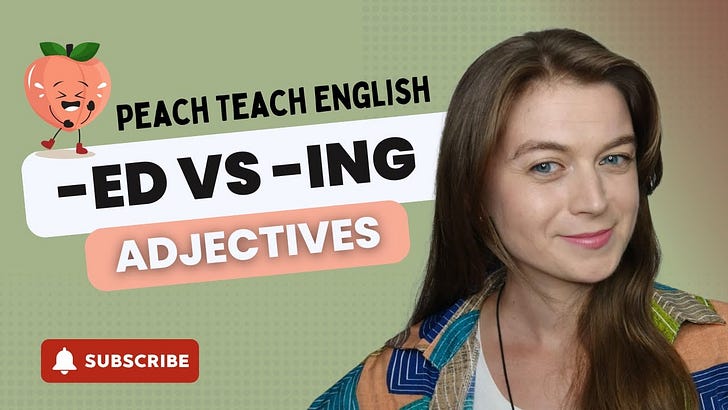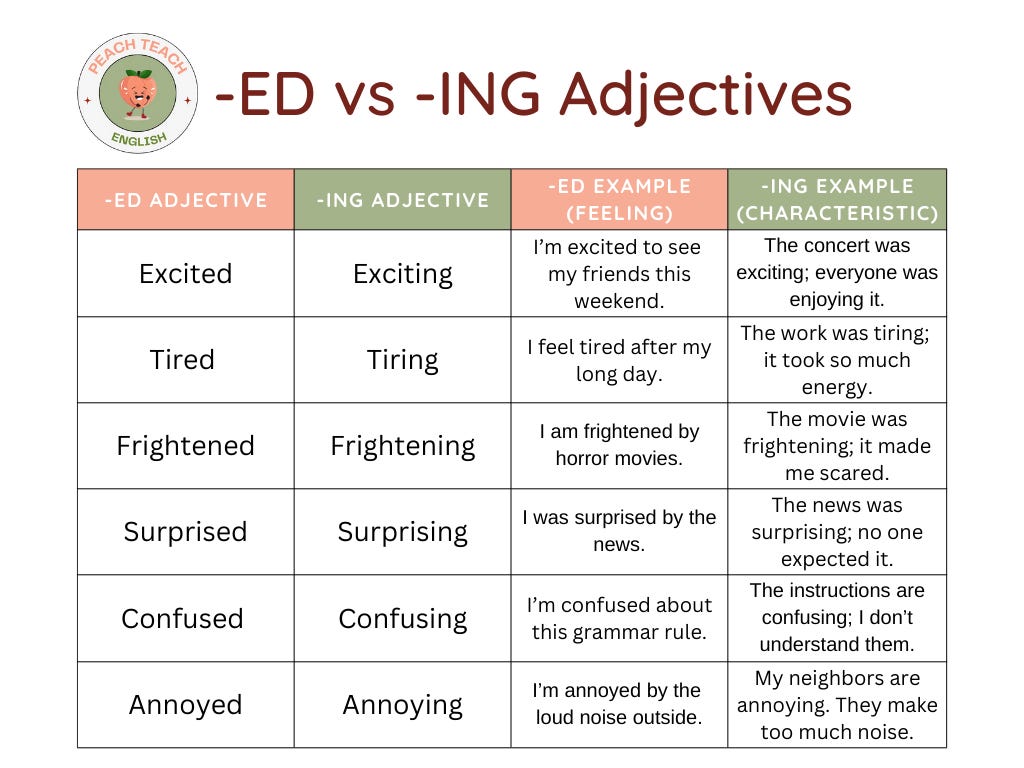How To Use -ED & -ING Adjectives Correctly
A Simple Guide to Understanding the difference between -ED and -ING Adjectives
Do you ever find yourself confused by adjectives like "bored" and "boring"? You’re not alone! In English, some adjectives end in -ed or -ing, and understanding when to use each one can be tricky. While they may look similar, -ed and -ing adjectives serve different purposes in describing nouns. In this post, we’ll explore the difference between these two types of adjectives, provide clear examples, and give you practice activities to help you use them correctly. By the end, you’ll feel more confident using these adjectives in your everyday English!
What’s the Difference?
The difference between -ed and -ing adjectives can be confusing, but understanding when to use each one will help you describe things more accurately in English. Watch my video and read the explanation below to get a clearer understanding of how to use them correctly.
Video Explanation
-ED Adjectives
-ed adjectives describe how we feel. These adjectives express emotions or reactions that we feel in response to something.
For example:
Bored: I am bored because I’ve been doing the same thing for hours.
(I am feeling bored.)
Interested: I am interested in this book.
(I feel interested in the book.)
-ING Adjectives
-ing adjectives describe the characteristics of things or people. These adjectives talk about the source that causes the feeling.
For example:
Boring: The movie is boring.
(The movie is causing the feeling of boredom.)
Interesting: This book is interesting.
(The book is causing the feeling of interest.)
In summary:
-ed adjectives = feelings, emotions
-ing adjectives = characteristics, what causes feelings.
*Quick Tip*
Since -ed adjectives describe feelings, they will only be used with people or animals as objects and places can’t have emotions. We can use -ing adjectives with people, places, or things.
Common Adjectives and Examples
Now that we’ve covered the basic difference between -ed and -ing adjectives, let’s look at some common ones. For each pair, we’ll compare the -ed and -ing forms to show how they change based on whether we’re describing a feeling or a characteristic.
Here’s a list of some more common examples of -ed and -ing adjectives:
Relieved / Relieving
Satisfied / Satisfying
Pleased / Pleasing
Amazed / Amazing
Horrified / Horrifying
Startled / Startling
Shocked / Shocking
Disgusted / Disgusting
Exhausted/Exhausting
This is not a complete list, but these are some of the most common adjectives that use this structure.
Practice Activities
Activity 1: True or False
The loud noise was shocking.
I felt boring during the movie.
I feel excited for my trip next week.
The party was so exciting.
I felt interesting in the story.
Horror films are frightened to me.
The teacher's lecture was boring.
The thunderstorm was terrified.
Activity 2: Fill in the Blank
The movie was so ___________ (boring/ bored) that I fell asleep halfway through.
I was ___________ (excited/ exciting) to hear the good news about my promotion.
The lecture was ___________ (frightening/ frightened), and many students left early.
I am ___________ (interested/ interesting) in learning how to play the guitar.
The book was so ___________ (amazing/ amazed) that I couldn’t put it down.
I am ___________ (satisfied/ satisfying) with the results of the project.
The rollercoaster ride was ___________ (terrifying/ terrified), but I had fun anyway.
The story was so ___________ (disgusting/ disgusted) that I couldn’t finish reading it.
Activity 3: Write Your Own Sentences
Write a sentence for each of the following questions. Make sure to use both -ed and -ing adjectives in your sentences. You can write your answers in the lines provided.
Describe a time when you felt ___________ (bored/boring) during a class or event.
______________________________________________________________________________________________
Write about a movie or book that was ___________ (exciting/excited) to you.
______________________________________________________________________________________________
Think of a topic that you are ___________ (interesting/interested) in. Why do you like it?
______________________________________________________________________________________________
Write about a moment when you felt ___________ (frightened/frightening) by something unexpected.
______________________________________________________________________________________________
Describe an activity that you find ___________ (satisfying/satisfied) to do in your free time.
______________________________________________________________________________________________
Write about a place you’ve visited that was ___________ (amazing/amazed).
______________________________________________________________________________________________
Think of a food or drink that you find ___________ (disgusting/disgusted). Describe it.
______________________________________________________________________________________________
Describe a situation that was ___________ (terrifying/terrified) to you.
______________________________________________________________________________________________
Answer Key
Activity 1: True or False
True
False (Correct: I felt bored during the movie.)
True
True
False (Correct: I felt interested in the story.)
False (Correct: Horror films are frightening to me.)
True
False (Correct: The thunderstorm was terrifying.)
Activity 2: Fill in the Blank
boring
excited
frightening
interested
amazing
satisfied
terrifying
disgusting
Activity 3: Write Your Own Sentences
These answers will vary based on students' responses.
bored
exciting
interested
frightened
satisfying
amazing
disgusting
terrifying
Start Using -ED and -ING Adjectives with Confidence
Now that you’ve learned the difference between -ed and -ing adjectives, you’re on your way to speaking English with more confidence and fluency. Remember, -ed adjectives describe how we feel, and -ing adjectives describe the characteristics of people, places, or things.
If you’re ready to take your English skills to the next level and gain more fluency and confidence in both professional and personal settings, I invite you to sign up for a FREE courtesy class! Let’s work together to help you achieve your English goals.







Wow!
Bankable.
I'm Nazir Ullah, rolling in Afghanistan country!
I butter you up!